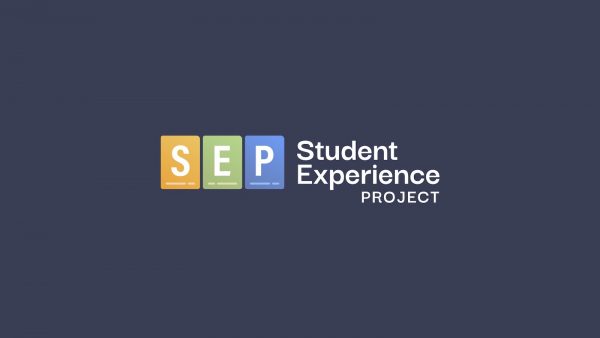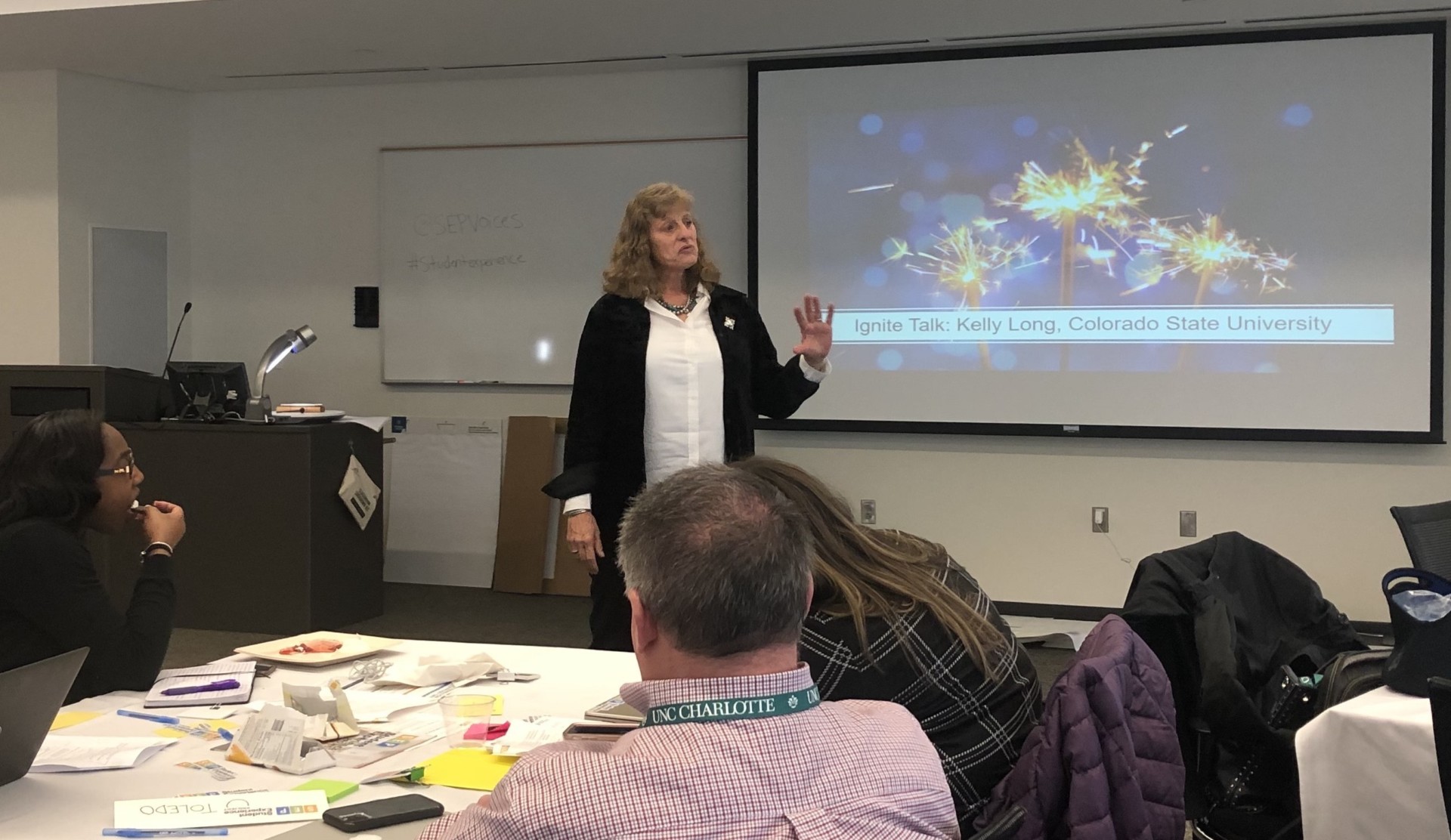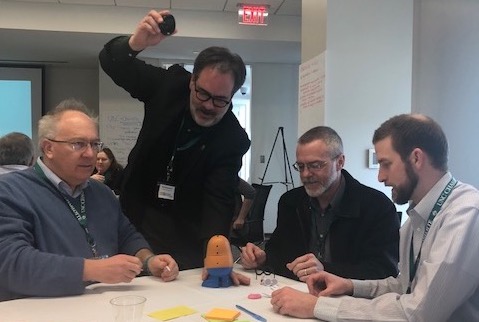All undergraduates at Colorado State University must complete a class in mathematics to earn their degree. Most fulfill that requirement by taking at least one massive introductory math class; those in the STEM disciplines must take pre-calculus. Some dread the experience.
In fact, throughout higher education, pre-calc has traditionally been used to “weed out” those without the right stuff to become scientists. The leadership and faculty of CSU’s math department are dedicated to changing that paradigm, to make mathematics work for all students.
The challenge is larger than you may think. CSU’s participation in the Student Experience Project, a national initiative from the Association of Public and Land-grant Universities in collaboration with the Raikes Foundation and other external partners, is central to that work. APLU selected CSU and five other member universities to develop clear steps to make the process of earning an undergraduate degree as welcoming and inclusive as possible.

CSU’s part of the project asks what would happen if the initial expectation that a certain number of students will inevitably fail a class was replaced by the message that, yes, pre-calc is hard, but the instructor is there to help students understand the material and actually succeed in learning it.
The cohort, which includes the University of Colorado Denver, Portland State University, University of New Mexico, University of North Carolina at Charlotte and the University of Toledo, is dedicated to developing and elevating new tools, resources, and practices that enable colleges to create opportunities for every student to fully engage and succeed in college and contribute to the future of their chosen fields.
CSU leadership
SEP launched in 2019 as a learning opportunity for the university partners and their support networks. The universities have completed the research phase that identified friction points affecting student experience, including a sense of belonging, institutional trust, or growth mindset of faculty. These results are being used to design practices that improve student outcomes.
CSU, which has focused on student success for two decades, is providing leadership for SEP.
“We’ve already done a lot of work through our Student Success Initiatives, but we still have a lot more to do to make campus a welcoming place for all students to learn,” explained Steve Dandaneau, associate provost and executive director of the Reinvention Collaborative, a consortium of research universities dedicated to improving the undergraduate learning experience. “Barriers to inclusion can be as subtle as the pictures of successful alumni [not from diverse backgrounds] on the wall, but they aren’t always physical; they can be embedded in our assumptions that shape our teaching methods. That’s where we’re focusing, on how we let students know that, as a university, we expect they can learn and grow and go on to successful lives and careers after graduation. The other schools may take different approaches. But anyone who says they already have it all figured out is not being honest.”
CSU Provost Rick Miranda, himself a mathematician, serves as the chair of the executive committee of APLU’s Council on Academic Affairs – the council of provosts – and understands the importance of supporting inclusion at all colleges and universities, and its challenges.
“CSU not only tries to lead in student success by example, but also by participation in these types of national consortia of universities with similar challenges and aspirations,” he said. “It’s important for us to share effective strategies and compare programs across a number of institutions, in order to continually improve.”
A team from CSU, including Dandaneau; Vice Provost for Undergraduate Affairs Kelly Long, who is the principal on the SEP initiative; Assistant Vice President for Student Success Ryan Barone; Laura Jensen, Vice Provost for Institutional Research, Planning, and Effectiveness; and Lisa Dysleski, assistant dean for undergraduate programs for the college of Natural Sciences at CSU and STEM lead, have attended a set of conferences focused on the SEP project over the past 18 months.
A meeting at the beginning of February, in Charlotte, North Carolina, asked participating schools to contemplate inherent inequities in institutions, classrooms, and instructional practices. The group heard from historian Ibram X. Kendi, who argues that the status quo is inherently racist and who invited the group to consider ways to take action to create equity.
“The convening focused on simple strategies that can be employed in classrooms to provide strategies for student success,” explained Long. “Providing frequent assessment to let students know where they stand in the course, offering supportive encouragement and specific ideas about how to meet standards are just a few examples of success strategies.”


At a recent meeting of the Student Experience Project cohort, CSU Vice Provost for Undergraduate Affairs Kelly Long delivered an “Ignite”-style talk on the importance of improving equity in higher education (left). When teams with members from various universities competed to build Mr. Potato Heads, not only did they learn the importance of process, communication, and continuous improvement practices, they also had a lot of fun, according to Long. Photos by Jenna Anderson.
Start at the beginning
True innovation always starts at the beginning: in this case, with the expectations set on the first day of class with the syllabus. That’s where the College of Natural Sciences’ participation in SEP begins as well.
“In an introductory class, with 300 or so students, there’s no way an instructor can develop a personal relationship with everyone, so the syllabus really sets the tone,” Dysleski said. “What we’re concerned with is how negative messages there land on students without strong preparation in the subject. How they experience the first year on campus determines how dedicated they are to completing their degree.”
The changes being developing are to the presentation of the courses, not the content, Dysleski said.
Monthly Master Teacher Institute workshops offer the college’s faculty tools they can use to help their students succeed, and a community to share ideas for other areas of improvement. For the next two semesters, sessions will be focused on creating a growth mindset in the classroom. Dysleski said there’s been real interest from faculty throughout the college, especially researchers who may not have received a great deal of training in teaching large classes.
For Ken McLaughlin, chair of the Department of Mathematics, the improvement process has begun with a team experimenting with new approaches to teaching the dreaded pre-calc. The faculty group looked at everything from the structure of the PACe program – where pre-calc classes are taught online with proctored exams taken on campus in a secure environment – to making tutors available for online chats during peak hours when students are actually studying, about 10:30 p.m.
“Math is a barrier that many students struggle with in their university careers, and how they experience math can have a profound effect on how they think about their own capabilities,” said McLaughlin, who also attended the meeting in Charlotte. “Essentially, we have been using middle-school methods to teach math to college students, and nobody enjoys it.”
The faculty team includes Steven Benoit, co-director of the PACe Center; Janet Oien, co-director of the Calculus Center; Hilary Freeman, senior teacher; and Jessica Ellis Hagman, who piloted a study last year to measure the effectiveness of instructors providing personal feedback on students’ work, to help them catch and correct their own mistakes.
Student success
Jenna Anderson, who graduated from CSU with a bachelor’s in math education in May, has been hired to coordinate SEP on campus. Anderson said that while her experience with math classes at CSU was positive, she recognizes the need to make learning more accessible to all students.
“I think the challenge for educators is to help students from all backgrounds learn and develop the confidence that they can learn even more,” she said. “The Student Experience Project provides support in measuring the effectiveness of the changes that are implemented, with a focus on creating evidence-based practices that could then be scaled.”
That ability to scale is one of the reasons Dandaneau feels that participating in SEP will result in improvements across the CSU campus.
“If it works for teaching math, it can work for any department.”